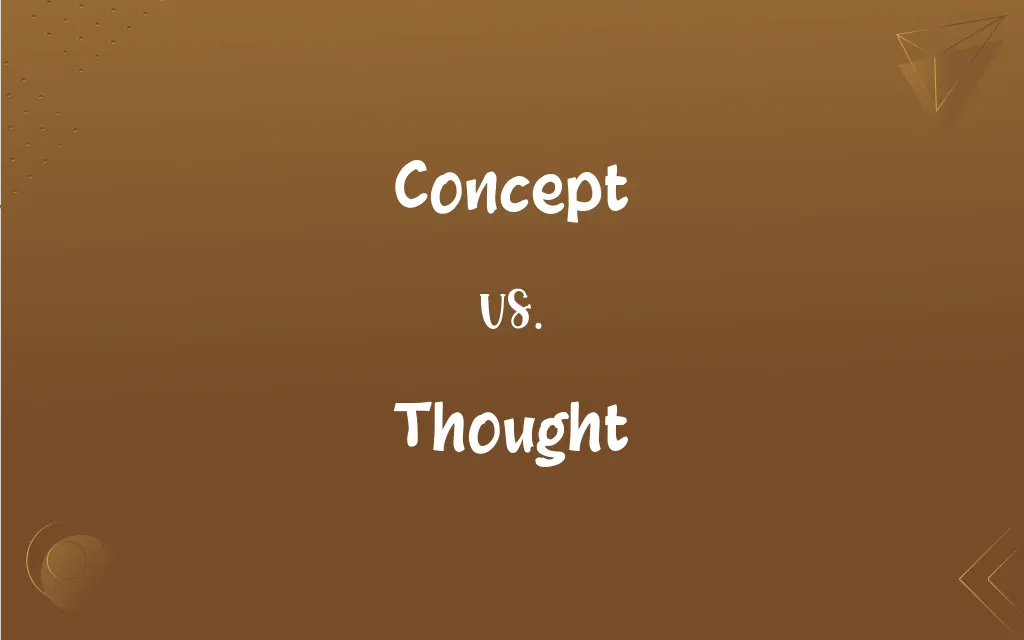Concept vs. Thought: What's the Difference?
Edited by Harlon Moss || By Janet White || Updated on September 22, 2023
A concept is a generalized idea or principle often used for understanding or explaining things. A thought is a mental construct or idea, usually fleeting and more specific to individual consciousness.

Key Differences
A concept is a mental construct that serves as a building block for understanding the world around us. Concepts are often used in various academic disciplines like philosophy, psychology, and natural sciences to create theories or models. These generalized ideas serve as a basis for rational discourse and enable shared understanding. On the other hand, a thought is more of an individual mental construct, something that occurs within the mind and can be as mundane as what to eat for lunch or as complex as contemplating the meaning of life.
Concepts tend to be stable, well-defined ideas that can be universally applied. For example, the concept of gravity is understood the same way regardless of the individual contemplating it. Thoughts, however, are subject to constant change and can be highly influenced by mood, environment, and individual experience. They can be intentional, such as when we actively ponder a subject, or involuntary, like when a random thought pops into our head.
Grammatically, "concept" is mostly used as a noun, as in "the concept of democracy." It can also be used less frequently as an adjective in specialized contexts like "concept art" or "concept car." Thought also predominantly serves as a noun but can act as the simple past and past participle form of the verb "think," as in "He thought about it."
While concepts often exist as formal ideas that are discussed, critiqued, and built upon in academic or professional settings, thoughts are generally more personal and may never be vocalized or shared. In summary, concepts serve as foundational elements that facilitate shared understanding and scholarly communication, whereas thoughts are individualized, momentary reflections or ideas that may or may not have broader implications.
Comparison Chart
Nature
Generalized idea
Specific mental construct
ADVERTISEMENT
Scope
Broad and universal
Individual and momentary
Grammatical Role
Mostly used as a noun
Mostly used as a noun, sometimes as a verb
Stability
Relatively stable
Subject to change
Usage
Academic, professional fields
Everyday, personal experience
Concept and Thought Definitions
Concept
Foundational principle
The concept of supply and demand drives economics.
ADVERTISEMENT
Thought
Cognitive process
Deep thought is required for problem-solving.
Concept
Generalized idea
The concept of justice is widely discussed.
Thought
Mental construct
The thought occurred to me suddenly.
Concept
Abstract notion
Time is a complex concept to grasp.
Thought
Individual idea
She shared her thoughts on the subject.
Concept
Theoretical framework
His concept of a perfect society is utopian.
Thought
Consideration
Give it some thought before deciding.
Concept
Intellectual construct
The concept of democracy shapes many governments.
Thought
Past tense and past participle of think.
Concept
A general idea or understanding of something
The concept of inertia.
The concept of free will.
Thought
The process of thinking; cogitation
Sitting deep in thought at the computer.
Concept
A plan or original idea
The original concept was for a building with 12 floors.
Thought
A product of thinking or other mental activity
What are your thoughts on this matter?.
Concept
A unifying idea or theme, especially for a product or service
A new restaurant concept.
Thought
The faculty of thinking or reasoning
Why not use thought instead of emotion to solve the problem?.
Concept
Having an experimental or strikingly different design, especially to test or demonstrate new features
A concept car.
Thought
The intellectual activity or production of a particular time or group
Ancient Greek thought.
Deconstructionist thought.
Concept
An abstract and general idea; an abstraction.
Thought
Consideration; attention
Didn't give much thought to what she said.
Concept
Understanding retained in the mind, from experience, reasoning and imagination; a generalization (generic, basic form), or abstraction (mental impression), of a particular set of instances or occurrences (specific, though different, recorded manifestations of the concept).
Thought
Intention; purpose
My thought is to live in a house on a lake.
Concept
(generic programming) A description of supported operations on a type, including their syntax and semantics.
Thought
Expectation or conception
She had no thought that anything was wrong.
Concept
To conceive; to dream up
Thought
(countable) Representation created in the mind without the use of one's faculties of vision, sound, smell, touch, or taste; an instance of thinking.
The greatest weapon against stress is our ability to choose one thought over another.
Concept
An abstract general conception; a notion; a universal.
The words conception, concept, notion, should be limited to the thought of what can not be represented in the imagination; as, the thought suggested by a general term.
Thought
(uncountable) The operation by which mental activity arise or are manipulated; the process of thinking; the agency by which thinking is accomplished.
Without freedom of thought there can be no such thing as wisdom, and no such thing as public liberty without freedom of speech.
Concept
An abstract or general idea inferred or derived from specific instances
Thought
(uncountable) A way of thinking (associated with a group, nation or region).
Traditional eastern thought differs markedly from that of the west.
Thought
Anxiety, distress.
Thought
(uncountable) The careful consideration of multiple factors; deliberation.
After much thought, I have decided to stay.
Thought
A very small amount, distance, etc.; a whit or jot.
Thought
Simple past tense and past participle of think
Thought
The act of thinking; the exercise of the mind in any of its higher forms; reflection; cogitation.
Thought can not be superadded to matter, so as in any sense to render it true that matter can become cogitative.
Thought
Meditation; serious consideration.
Pride, of all others the most dangerous fault,Proceeds from want of sense or want of thought.
Thought
That which is thought; an idea; a mental conception, whether an opinion, judgment, fancy, purpose, or intention.
Thus Bethel spoke, who always speaks his thought.
Why do you keep alone, . . . Using those thoughts which should indeed have diedWith them they think on?
Thoughts come crowding in so fast upon me, that my only difficulty is to choose or to reject.
All their thoughts are against me for evil.
Thought
Solicitude; anxious care; concern.
Hawis was put in trouble, and died with thought and anguish before his business came to an end.
Take no thought for your life, what ye shall eat, or what ye shall drink.
Thought
A small degree or quantity; a trifle; as, a thought longer; a thought better.
If the hair were a thought browner.
This [faculty], to which I gave the name of the "elaborative faculty," - the faculty of relations or comparison, - constitutes what is properly denominated thought.
Thought
The content of cognition; the main thing you are thinking about;
It was not a good idea
The thought never entered my mind
Thought
The process of thinking (especially thinking carefully);
Thinking always made him frown
She paused for thought
Thought
The organized beliefs of a period or group or individual;
19th century thought
Darwinian thought
Thought
A personal belief or judgment that is not founded on proof or certainty;
My opinion differs from yours
What are your thoughts on Haiti?
Thought
Reflection
After some thought, he changed his opinion.
FAQs
Are concepts always abstract?
While many concepts are abstract, some can have concrete elements.
Can a thought become a concept?
A thought can evolve into a concept if it gains broader acceptance and undergoes rigorous examination.
How are concepts formed?
Concepts are often formed through collective understanding, scholarly research, or cultural norms.
Can a concept be proven wrong?
Yes, concepts can be challenged and revised based on new evidence or perspectives.
How do you explain a complex concept?
Complex concepts are often explained through theories, examples, and simplification.
Are all concepts universally accepted?
No, the acceptance of a concept can vary culturally and academically.
Can thoughts be controlled?
Thoughts can be guided but not entirely controlled, as they often arise spontaneously.
Can thoughts be harmful?
Persistent negative thoughts can be detrimental to mental health.
Is daydreaming a form of thought?
Yes, daydreaming involves a form of spontaneous or involuntary thought.
Is a model the same as a concept?
A model is often a representation of a concept but is not synonymous with it.
How are concepts and categories related?
Categories are often built around shared concepts for easier understanding and organization.
What triggers thoughts?
Thoughts can be triggered by external stimuli, emotions, or previous ideas.
How are thoughts and feelings related?
Thoughts can influence feelings, and vice versa.
Can animals understand concepts?
Some animals can grasp basic concepts, but human understanding is generally more complex.
What's the difference between a thought and an opinion?
An opinion is a belief or judgment, whereas a thought is a broader term that includes all kinds of mental constructs.
About Author
Written by
Janet WhiteJanet White has been an esteemed writer and blogger for Difference Wiki. Holding a Master's degree in Science and Medical Journalism from the prestigious Boston University, she has consistently demonstrated her expertise and passion for her field. When she's not immersed in her work, Janet relishes her time exercising, delving into a good book, and cherishing moments with friends and family.
Edited by
Harlon MossHarlon is a seasoned quality moderator and accomplished content writer for Difference Wiki. An alumnus of the prestigious University of California, he earned his degree in Computer Science. Leveraging his academic background, Harlon brings a meticulous and informed perspective to his work, ensuring content accuracy and excellence.































































